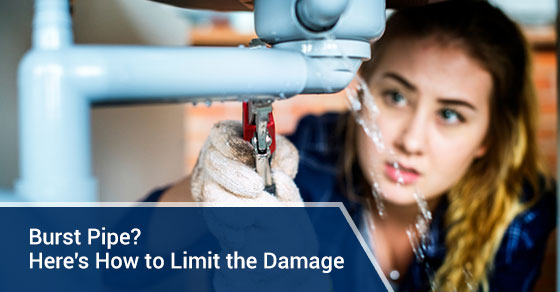 10
Dec 2018
10
Dec 2018
Burst Pipe? Here’s How to Limit the Damage
Burst water pipes can have devastating effects on your home, building, valuables, and even neighbouring properties. Whether it happens due to the old age of pipes, freezing water pipes in extremely cold weather, or some other kind of damage to the pipes, the consequences can be dire, including:
- Damage to furniture, appliances, and fittings in your home, building, or neighbouring property
- Structural and aesthetic damage to a home, building, and/or neighbouring property
- Cost of repair work and temporary relocation depending on the extent of the damage
Here are a few preventative ideas to help keep your pipes from bursting:
Ensure the Pipes are Well-Insulated
It is important to keep your pipes and water tanks well insulated at all times. Exposed pipes that are open to the elements tend to constantly expand and contract with fluctuating temperatures, which in turn increases the risk of bursting. These loopholes can be easily identified and corrected by your plumbers with routine service and inspections.
Regular Boiler Service
Getting your boiler serviced by a professional plumber before winter will help you to not only identify and fix any potential problems before they result in serious damage, but also ensure that it is functional and working efficiently throughout the cold season when you need it the most. Emergency boiler breaks down in the dead of winter can be catastrophic, with the exposed pipes susceptible to adverse weather, serious damage, and very expensive repairs.
Keep the Internal Temperature Stable
During extremely cold weather, you will be depending on your heating system to keep the indoors warm and comfortable. It is important that you let your heating system run 24 hours a day, even when there’s no one home, to keep the temperature of the water pipes stable. This will help to prevent stagnant water in the pipes from freezing and causing the pipes to burst. Make sure to allow some of the warm air to flow into the loft to keep the pipes from freezing.
In addition, if you plan on leaving your home for an extended period of time, make sure to check whether your insurance policy requires that your home is kept above a certain temperature for any claims to be valid in the event of burst pipes.
My Pipe Burst, What Next?
In the unfortunate event that you have burst pipes, it is important that you try to limit the damage as much as possible by taking immediate action:
- Turn off the water supply – As soon as you suspect a burst or damaged water supply, the first step should be to turn off the entire water supply at the main stopcock or shut-off valve. It is important that all the occupants in your home know the location of the stopcock or shut-off valve to your main water supply, and can use it well. This valve has a red handle and is typically located in the bathroom, under the sink, cloakroom, garage, furnace room, near the water tank, or under the stairs.
- Call the Local Fire Department – If you can’t locate the shut-off valve, and the leakage is serious, just call your local fire department. These professionals will likely know where to find the valve and even the source of the leakage to minimize the water damage.
- Clean it up – If it is safe, move the furniture and other valuables away from the flooded area and try to soak up as much of the leaked water as possible using available supplies. You can also dry out the area using fans and dehumidifiers. Stay away from electronics that may have been damaged by the water.
Call a Plumber
For your own safety, and to avoid any action that may cause even more damage, it is best that you have a professional plumber with you when inspecting the burst plumbing or pipe system.
The plumber will locate the source of the ruptured pipe, whether it is in the exterior walls or ceiling, and repair it. They may also sanitize and deodorize the area to prevent mould and odours due to the damp conditions. If you’re insured, another contractor may come in to restore and rebuild the damage by installing new flooring, cabinets, or drywall, and/or cleaning the carpets and painting the walls and ceilings.
Call an Electrician
If you suspect that the water may leak onto the electrical system, you should turn off the electricity at the main switch and contact the electrician. In some cases, you could just turn off the circuit breakers in the affected areas. But if you’re unsure, just turn everything off. If it’s dark, use a torch to continue the inspection.
Contact Your Insurance Provider
Check your home emergency cover or home insurance policy to find out what you’re covered for, such as emergency plumber call-outs, and then inform them about the problem as soon as possible. Your insurance provider has specialist knowledge and can advise you on the best way forward. They will also send someone to assess the damage.
Final Note
The best way to minimize the risk of pipes bursting and limit the extent of any damage in the event they burst is by preparing for the worst. Routine service and maintenance of your plumbing and pipe system, especially before winter can dramatically reduce the risk of burst pipes due to freezing. In addition, make sure that you have the emergency contact information for your plumber, electrician, and property/building managers if you live in an apartment building or office block, and that you have adequate insurance cover. Keep in mind that water damage should be handled fast, as mould begins to grow in only 72 hours.
For professional, plumbing services, contact Brothers Plumbing online or by telephone at 1-800-741-8471.
